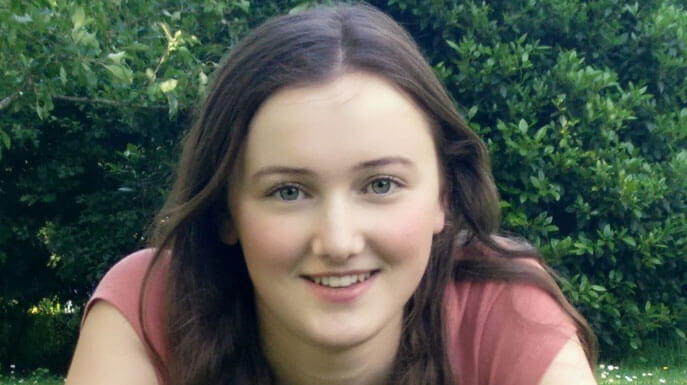There is so much pressure to succeed around exam time and not managing the situation can lead to so much worse than not getting the grades you want, it can have serious implications for your health.16-year-old Rosie knows this all too well, as she suffered from Chronic Fatigue Syndrome (CFS) and burnout, but came out of it with a technique called The Lightning Process and achieved all A*s (except one A in Geography) in her GCSEs.
The Lightning Process is a training programme that's been around for 18 years and can reverse depression, anxiety, acute pain, eating disorders, CFS and many other chronic conditions.
We spoke to Rosie about her condition and how she overcame it:
When did you realise that you had an issue?
I had been struggling with fatigue for about four months before it became a real issue. I had just begun to start year 10 when the condition developed and then I could no longer cope with school. I spent the next year off not being able to cope with any kind of stimulation at all, not even music, reading or seeing friends!
How did this manifest itself for you personally?
The main symptom was the fatigue but my vision was also affected- being pixelated and sensitive to light. The interesting aspect to M.E/CFS I think is that it affects all systems of your body from immunity, temperature regulation, digestion and focus, as your body starts to shut down systems it does not require in order to conserve energy. Raising awareness for illnesses like this I feel is so important as it can be so easily misunderstood due to how varied it can be. One week I could be bed-bound, the next sofa-bound, some days crawling around, other walking. There never was a constant.
Where do you feel the pressure you felt was coming from?
A lot of the pressure I felt came from myself. High-achievers and perfectionists commonly are affected with CFS and this was no different with me. I always expected myself to be the very best at everything I was doing before I became ill, giving myself no time to relax. I was competing in tetrathlons, cross-country running, hockey, dressage and shooting, fitting training for all these each week on top of my passion to succeed academically at school, and understandably it all became too much! I worked well past my body's signal to relax and on top of pressure I felt also from school I continued out of fear of failure and letting people around me, and myself, down.
What steps did you take to find help?
I started off going down the conventional route and became upset and frustrated at how misunderstood the illness was as well as how little was available to help people recover from it. An NHS doctor told me I would never get better and I should never return to education again. I then tried Kinesiology, Pacing, Osteopathy, nutritional support, Homeopathy (and probably a few others I have now forgotten!) before at a last resort coming across a Neuro-Linguistic Programming based course called The Lightning Process, which gave me my life back, in as little as two hours!
How have you learned to manage CFS?
Despite the NHS treatments seeming to be approaches that currently only help manage CFS, I don't need to manage CFS anymore, as I don't have it! I feel incredibly lucky to have come across The Lightning Process. It is a training course that teaches you how to use the mind-body connection to improve your health by using the idea of neuro-plasticity (that our brain adapts depending on how we use it), our conscious language and visualisations to quickly get the body into a healthy state. In all honesty I went into it a little sceptically as we live in a society that is so dependant on taking medication to get better and so playing an active role in my own recovery in this way seemed strange- I didn't realise just how powerful the conscious mind can be! I had a 2 hour session in London and went from around 3 hours a day at school to full time overnight, and have not looked back since. It was just incredible.
If people feel like things are getting on top of them- what advice do you have for them?
This is something I feel is so important to address, in particular for students. The education system puts so much pressure on us all that it is easy to feel overwhelmed. I'd say that, in learning from the effects my perfectionism had on me, that perspective is important. I have learnt to ask questions to myself like, ‘What is the most important thing right NOW?' and ‘In a years time will I still remember what I was worrying about?' to help me manage myself better.
Quite often the most important thing to me right now could be to take a break or do something I love but that's definitely OK- perfectionism is not the way forward and making sure you distance yourself from work too can be helpful in so many ways. Also, talking to yourself like you would a friend is effective to take pressure off because as much as I would tell myself to work continually I know if I constantly told this to my friends I wouldn't have any! I am always telling my own friends to take a break and doing this to myself more is something I still am working at. You have to be kind to yourself too.
How were your family and friends?
Despite not being able to see my friends at all when I was ill they all kept in touch and couldn't have been more supportive - hearing what they had been up to at school made normality seem a little closer to me.
I had to stay back a year as a result of the time I had missed, which meant going through the transitions of starting part-time and then later full-time with a new group of people around me. I feel so lucky with how everything worked out as these people in my new year, despite perhaps not being able to understand my illness, still seemed to be perfect at making me feel so happy each time I came into school. They were, and will always be, some of the best friends I could ask for, and they probably don't realise just how much they helped me deal with everything at the time.
I can't put into words how much these people mean to me now. Of course, my parents and brother too who were the only ones who saw me at my very worst, and so played such a special role- I can't understand what it was like from their perspective so I admire them all too for this. In addition to this, the countless practitioners and different medical professionals I saw that were all trying to make me better made me feel I really had a team of people around me that genuinely wanted me to be well, I still keep in touch with the LP practitioners that made me recover!
How does it feel to get the results you did in the end?
I feel so lucky. The results I had with the LP and the way it cured me so quickly was incredible and I feel so grateful I came across it as I know there are many people out there with ME that may have it for life otherwise.
I believe everything happens for a reason though and so many unique and brilliant things have come into my life as a result of what happened: I am so much more positive and have learnt so much about perspective, I have met the best group of friends I just wouldn't know otherwise and I have just started working with a research group at Oxford University on empathy in medicine.
I use the tools I learnt from the LP to help me with other things such as exams and this was for sure a large factor in helping me get the 10 A*s in my GCSES last year only shortly after returning to school full-time.
Currently with my AS exams I use them too- simple things like visualising the exam going well or imagining someone with the qualities you would like in the exam room that you know next to you guiding you through helps me so much- the mental side of exams is definitely not recognised enough in schools and I think it would be so beneficial to implement tools like this into the education system in the future.



